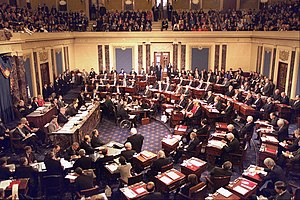
Back عزل بيل كلينتون Arabic Uchelgyhuddiad Bill Clinton CY Amtsenthebungsverfahren gegen Bill Clinton German Impeachment of Bill Clinton English Proceso de destitución de Bill Clinton Spanish استیضاح بیل کلینتون FA משפט ההדחה של נשיא ארצות הברית ביל קלינטון HE Բիլ Քլինթոնի իմպիչմենտ HY Pendakwaan terhadap Bill Clinton ID Impeachment di Bill Clinton Italian
| Impeachment of Bill Clinton | |
|---|---|
 Floor proceedings of the U.S. Senate during the trial of President Bill Clinton in 1999, Chief Justice William Rehnquist presiding. House managers are seated beside the quarter-circular tables on the left and the president's personal counsel on the right. | |
| Accused | Bill Clinton, President of the United States |
| Date | December 19, 1998 to February 12, 1999 |
| Outcome | Acquitted by the U.S. Senate, remained in office |
| Charges | Perjury (2), obstruction of justice, abuse of power |
| Congressional votes | |
| Voting in the U.S. House of Representatives | |
| Accusation | Perjury / grand jury |
| Votes in favor | 228 |
| Votes against | 206 |
| Result | Approved |
| Accusation | Perjury / Jones case |
| Votes in favor | 205 |
| Votes against | 229 |
| Result | Rejected |
| Accusation | Obstruction of justice |
| Votes in favor | 221 |
| Votes against | 212 |
| Result | Approved |
| Accusation | Abuse of power |
| Votes in favor | 148 |
| Votes against | 284 |
| Result | Rejected |
| Voting in the U.S. Senate | |
| Accusation | Article I – perjury / grand jury |
| Votes in favor | 45 "guilty" |
| Votes against | 55 "not guilty" |
| Result | Acquitted (67 "guilty" votes necessary for a conviction) |
| Accusation | Article II – obstruction of justice |
| Votes in favor | 50 "guilty" |
| Votes against | 50 "not guilty" |
| Result | Acquitted (67 "guilty" votes necessary for a conviction) |
The impeachment of Bill Clinton began in December 1998 by the House of Representatives and led to a trial in the Senate for the impeachment of Bill Clinton, the 42nd President of the United States, on two charges, one of perjury and one of obstruction of justice.[1]
These charges were caused from a sexual harassment lawsuit filed against Clinton by Paula Jones. Clinton was found not guilty of these charges by the Senate on February 12, 1999.[2]
Four charges were considered by the full House of Representatives; two passed, making Clinton the second president to be impeached, after Andrew Johnson in 1868.
- ↑ Erskine, Daniel H. (2008). "The Trial of Queen Caroline and the Impeachment of President Clinton: Law As a Weapon for Political Reform". Washington University Global Studies Law Review. 7 (1). ISSN 1546-6981.
- ↑ Baker, Peter (February 13, 1999). "The Senate Acquits President Clinton". The Washington Post. The Washington Post Co. Retrieved December 4, 2013.